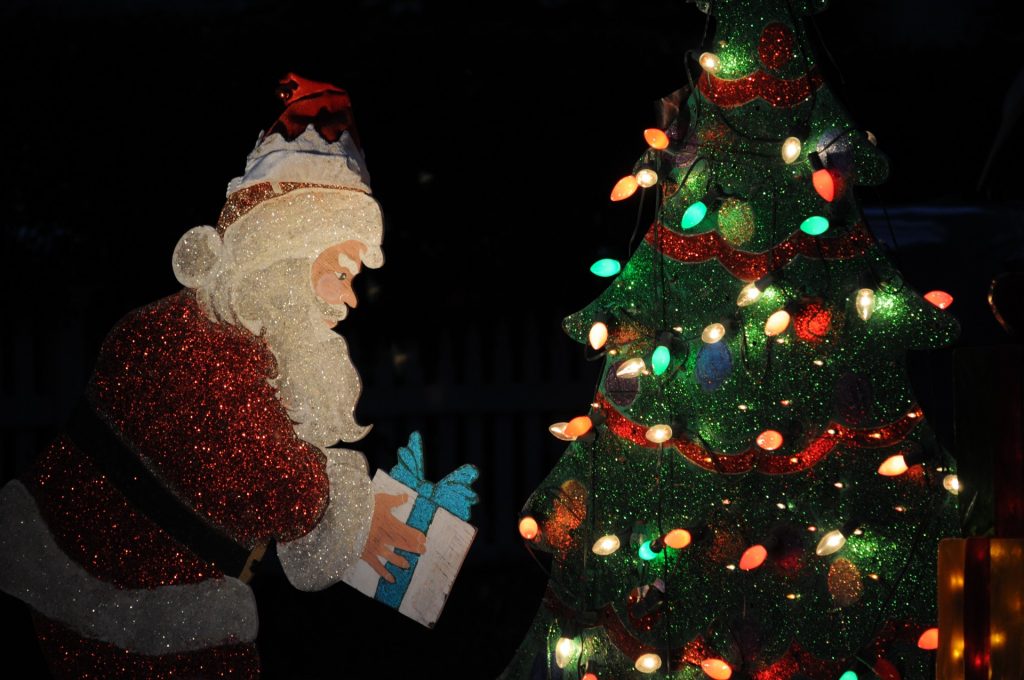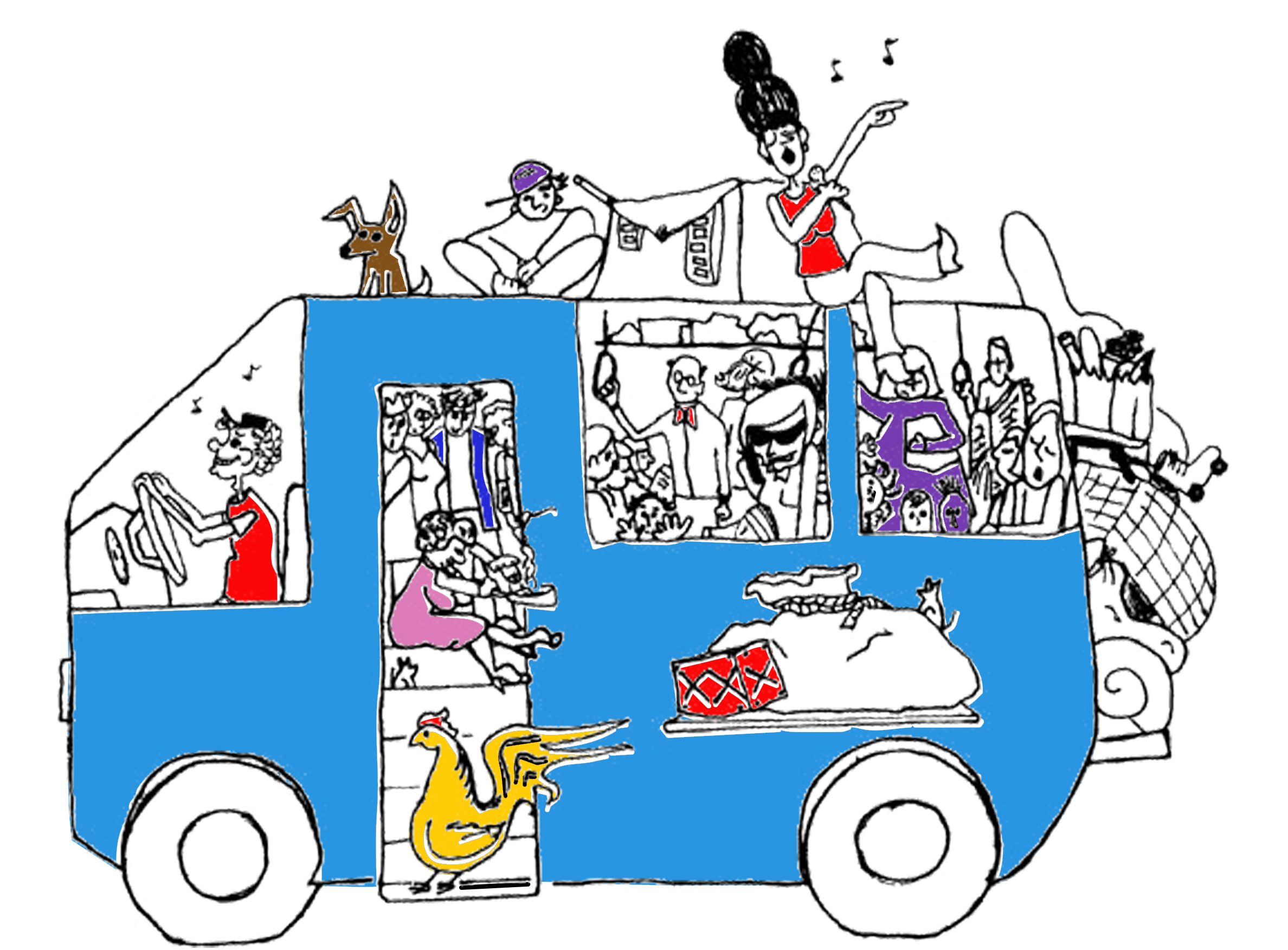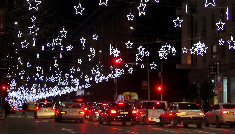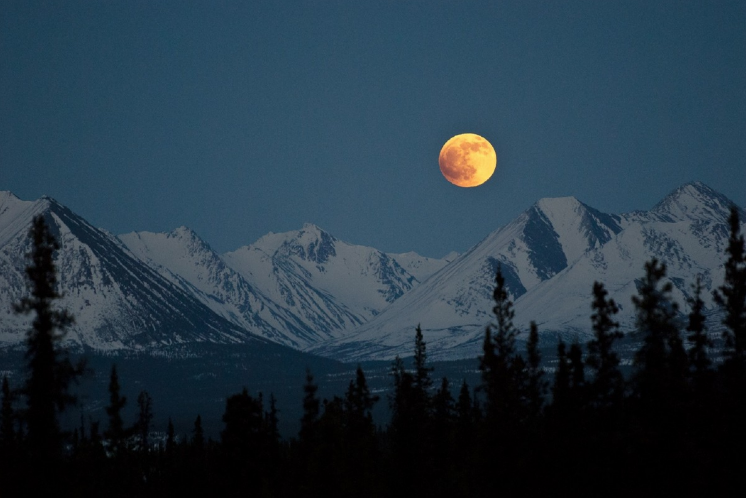Santa Could Use Our Help
by Carol S. Hyman
 When I was nine or ten, my sister and I hatched what we thought was a brilliant Christmas plan. Having saved our allowance to buy each other gifts, we went to the dimestore and chose little plastic cases containing matching pens, mechanical pencils, and other implements long since forgotten. Most importantly, each case held a tiny pen-sized flashlight.
When I was nine or ten, my sister and I hatched what we thought was a brilliant Christmas plan. Having saved our allowance to buy each other gifts, we went to the dimestore and chose little plastic cases containing matching pens, mechanical pencils, and other implements long since forgotten. Most importantly, each case held a tiny pen-sized flashlight.
We were allowed to open one gift on Christmas Eve; our bright idea was to choose each other’s. Then, once our parents were in bed, we crept out and used those tiny beams of light to explore the loot Santa had left under the tree. Truth be told, I was suspicious of Santa by then, having been asked by my mother a couple of years earlier to query my dad about whether he thought Santa wanted milk and cookies left out for him. His reply: “Tell your mother I think Santa would rather have a bologna sandwich and a beer.”
Finances must have been good for our salesman father the year of our penlight reconnaissance, because there was more treasure under the tree than we could have imagined. Later that trusty little light helped me scout the vast land of literature under the covers after bedtime. (As a child, I thought “lights out” were fighting words; I still think one of the greatest perks of being an adult is not being told when that has to happen.)
Humans instinctively long for light; it enhances our awareness and provides profound comfort. Few movies linger, but Quest for Fire has stuck in my mind over the decades, not for the sex scenes, interesting as our ancestors’ mating rituals may have been. No, what I keep remembering is how vividly the film conveys the terror people felt at night before they knew how to make fire. Wilderness trainers describe how quickly the spirits of people lost in the woods – feeling cold, alone, and desolate – lift as soon as a fire is lit.
Our eyes detect light that banishes physical darkness. Ignorance is another kind of darkness, vanquished by a different kind of light. Barely two centuries ago, doctors went from death bed to birthing room without washing their hands, and the word germ simply meant to sprout or grow. As far as physical infection goes, we think of those as the dark ages. Our descendants may well come to view the present time as a kind of dark age too, a time when mind was so little understood that malignant tendencies could freely proliferate and fester in the human psyche, expressing themselves in unfortunate behavior ranging from rudeness to genocide.
Although sanitation was key in improving public health in the 19th century, better plumbing won’t remedy what ails us in the 21st. Sanitation and sanity both derive from a root meaning healthy, but salvaging sanity calls for a diligent and personal approach. Call it mental hygiene. While sunlight may be the best disinfectant in politics, in the psychological realm it is the light of awareness that illuminates tendencies that cause trouble.
The word light has long been used in relation to awareness: we shed light on the matter and things come to light. When all those philosophers, scientists, and artists got cooking centuries ago, nobody thought to name it The Endarkenment. The 21st century sequel to The Enlightenment will come from human beings learning to direct our attention using the practice of mindfulness. This is the tool by which we focus the light of awareness to detect habitual mental and emotional patterns and discern which bring benefit and which cause problems.
We all carry cargo, inner baggage that can leak out into the environment. These negative patterns may once have been called demons; today we’re more likely to label them neuroses or addictions. No matter what we call them, what’s important is to understand that we loosen their grip by paying attention to them.
Often those patterns developed as coping mechanisms; seen in the light of awareness and appreciated for how they may have served us in the past, they relax and reveal the fear that lurks behind them. Merely seeing what we carry lightens the load, which explains a central tenet in conflict resolution: disputes become less heated if all parties feel their perspectives are being heard. We don’t have to try to change ourselves. To become conscious of the tendencies we carry, we just need to inquire within.
Our curiosity will uncover clues we can use to decode our lives. There is wisdom inherent in coping mechanisms, addictions, and other seeming hindrances. Like Typhoid Mary, humans have been unwitting carriers of energetic afflictions, passing unwholesome habitual patterns along for generations. Liberating the energy stuck in those patterns by shining the light of awareness on them, we purify powerful negativity. We filter from the energetic atmosphere confused and contagious tendencies by reconnecting with our basic nature.
A hundred and twenty years ago the editors of New York’s The Sun received this letter:
Dear Editor—
I am 8 years old. Some of my little friends say there is no Santa Claus. Papa says, “If you see it in The Sun, it’s so.” Please tell me the truth, is there a Santa Claus?
Virginia O’Hanlon
115 West Ninety Fifth Street
The idea that a father – however tongue in cheek his suggestion may have been – would encourage his daughter to have such faith in the press may strike us as quaint. But the editor’s response has held up, becoming part of American holiday lore. “Yes, Virginia, there is a Santa Claus. He exists as certainly as love and generosity and devotion exist, and you know that they abound and give to your life its highest beauty and joy.”
These days it feels like Santa could use a little help. Sometimes it almost seems we’ve forgotten that certainty about love and generosity and devotion ever existed. But if enough of us are willing to do the work of exploring how patterns within us interact with patterns in the world around us, we might just be able to deliver beauty and joy to a world that is sore afraid.
And that would be a brilliant plan, not only for Christmas, but for every day. Good tidings of great joy – that we humans hold the key to our own sanity – might reveal more treasure than we ever could have imagined, just waiting in the dark for us to shine a little light and claim it.





One thought on “Actually, Virginia”
Dear Carol & Patton,
This is a beautiful and brilliant (meaning shining a lovely light) essay — Thank you! On this shortest day of the year, I send wishes for good health and continued spreading of sanity in the year to come.
Blessings, love, and light–
Grace (& Pete)